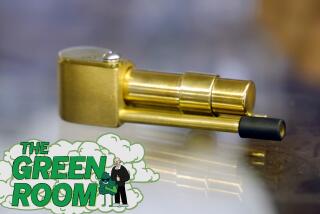Praise for Bagpipes at English Country Museum : Rare instruments and haunting sounds in the Northumbrian market town of Morpeth.
- Share via
I had not planned to detour through the market town of Morpeth on that brisk English morning; I’d never even heard of the place.
But my Scot’s heart had been stirred beyond reason when I saw the sign beside the A1 motor way: “Bagpipe Museum, 1 Mile.”
It was a Saturday of thin sun. Older couples in longer cardigans were walking their dogs along the river that ran through the sloping greensward of Carlisle Park. Youngsters pedaled tricycles along the sidewalks, vigorously ringing their bells.
In the center of town, beyond an ancient stone bridge and a 13th-Century chapel, I found a parking place. The town clock struck 10 as a volunteer unlocked the museum door.
The Morpeth Chantry Bagpipe Museum opened six years ago in this sleek space overlooking the River Wansbeck and immediately garnered honors from the National Heritage, as well as the Illustrated London News, which selected it museum of the year.
It’s easy to see why. Rare instruments of rosewood and brass, velvet and leather and ivory, are suspended from invisible wires in tall, free-standing glass cases. Legends are lively, and written in large print.
A cheery curator, in a woolly sweater and tartan skirt, handed me headphones for, I assumed, the spiel. But no words interrupted my reverie, only the sweet, haunting music of pipes.
The most intriguing part of this sophisticated sound system is that what you see is what you get to hear. When you face a display of small Irish pipes, lilting Irish tunes tickle your ears. When you turn to study the pipes from France, the music changes as well. The irresistible game, eventually, is to stand in the middle of the room and move your head this way and that, while the international repertoire interrupts itself to keep up.
The Morpeth museum is based on the collection of one man: the late William Alfred Cocks of County Durham, a master clockmaker who began collecting pipes in World War I and then taught himself to make them. Today a top name in pipe-making--and a big museum booster--is David Burleigh, who set up a workshop in Morpeth 20 years ago.
Perhaps the biggest surprise for me was to learn that the familiar Highlander bagpipes are just one part of the story--though no doubt the largest and loudest.
Or that Vivaldi and Handel wrote music for the bagpipe.
Or that the popularity of English bagpipes faded in the 19th Century with the boom in fiddles and concertinas, which were thought to be easier to play and maintain.
In England, only the Northumbrian small pipes survived, thanks to the formation of groups such as the Northumbrian Pipers Society in Morpeth, which joined the cause in 1928 and now is the oldest of many preservation societies, from Czechoslovakia to Tunisia to France.
Historically, Northumbrian pipes were part of the work scene in the northern English counties. Their droning rhythm kept soldiers in step, road menders digging and farm workers harvesting. They were played at feasts and weddings and bear baitings. They signaled the curfew at night.
Now bagpipes are the stars of worldwide concerts, crying their way through baroque melodies and blues, hymns and rock tunes. The latest development, I learned, is electronic pipes: bagpipes with volume that can be adjusted to match a saxophone or electric guitar.
On a map, little Morpeth lies south of Alnwick and north of Newcastle, and if that doesn’t mean much it’s because Northumbria is simply not overrun with tourists. Visitors come with special interests: curiosity about the 73-mile-long Roman Wall built by Hadrian; or such landmarks of Christianity as the haunting priory on the Holy Isle of Lindisfarne, founded in the 7th Century, or the graceful cathedral at Durham, which celebrates its 900th anniversary this year.
Northumbria has abundant castles, stately homes and pleasant country pubs. But many travelers see this stretch of England as merely a roadside coffee break between the wildly popular destinations of York and Scotland.
A major luxury of travel is unscheduled time, which, on that Saturday, I had. Driving south from Morpeth, I saw the exit for York and, on impulse, made a looping detour for tea in the grand walled city.
More to Read
The biggest entertainment stories
Get our big stories about Hollywood, film, television, music, arts, culture and more right in your inbox as soon as they publish.
You may occasionally receive promotional content from the Los Angeles Times.








